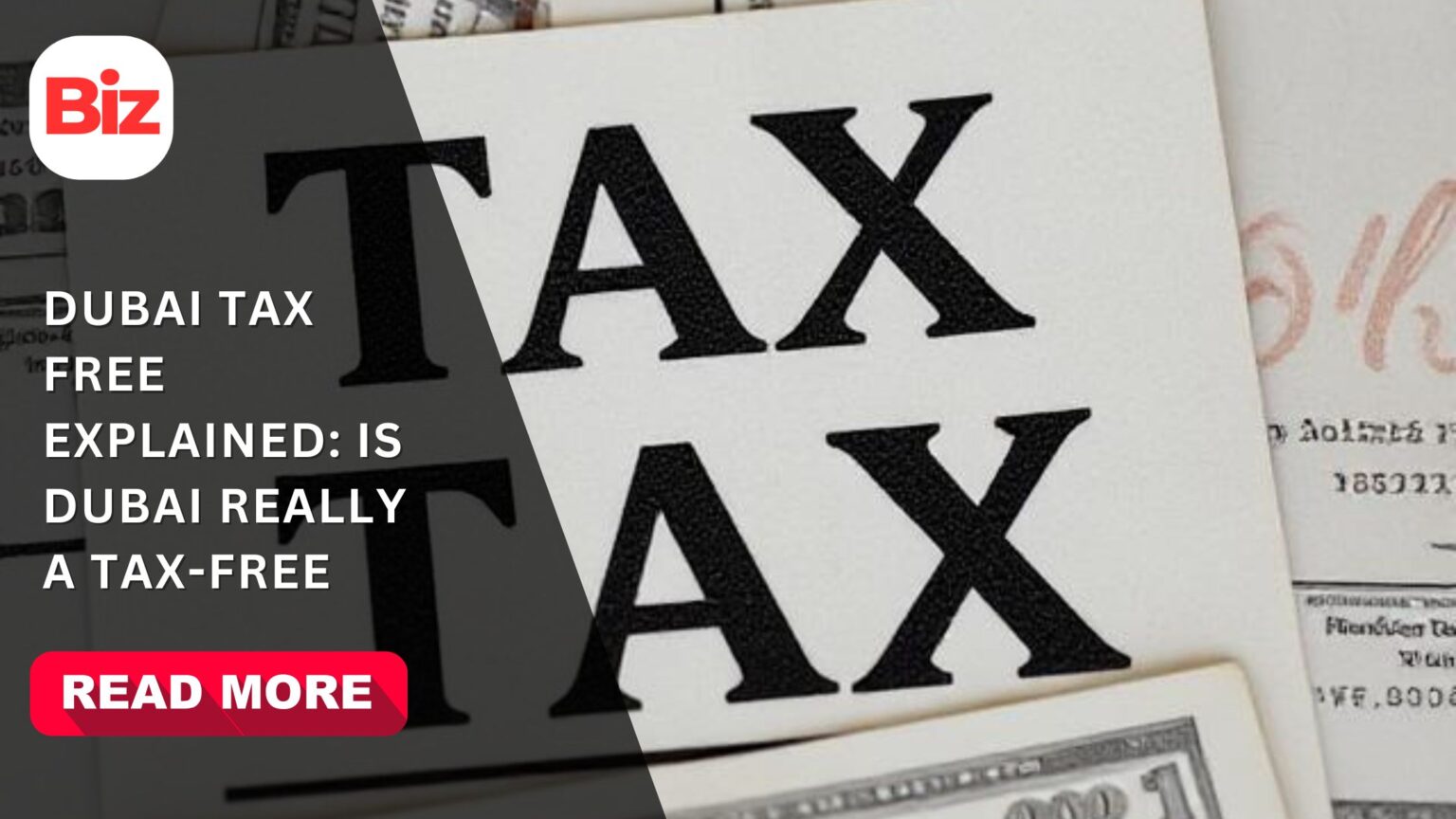- Is There Tax in Dubai? Myth vs Reality
- Expats in Dubai: What is the amount of tax they pay?
- Understanding the New Tax in Dubai
- VAT in UAE: What You Need to Know
- The Reality of Free Tax Dubai
- Benefits of Dubai’s Tax System
- VAT Refund Dubai: How Tourists Benefit
- Why Dubai is Still a Tax-Free Haven
- Final Thoughts
- FAQS
Dubai is said to be a paradise without taxation, where expats and entrepreneurs are able to make high payments and retain most of their finances. It is this idea of tax-free Dubai that has transformed the city into a dream destination for professionals, investors, and businesses in the global market. One of the most attractive features is the lack of personal income tax, which means Dubai is unlike many countries that share heavy taxation frameworks.
However, while Dubai is often called a tax-free country regarding income tax, it is not completely tax-free. In recent years, the government has implemented VAT in the UAE, corporate tax, excise taxes, and other fees to diversify revenue and strengthen the economy.
We will also analyze the truths and discuss the extent of the facts, which is why, even with the new taxes in Dubai, the city remains considered one of the most tax-friendly places in the world.
Is There Tax in Dubai? Myth vs Reality
The question that a lot of people will ask is: Is there tax in Dubai? The short answer is yes and no.
- Yes – as in UAE there is the payment of VAT, excise tax on selected goods and the levying of the customs tax and 9 percent corporate tax on business profits which exceed 375,000 AED.
- No – due to the absence of personal income tax, no wealth tax, no foreign earnings tax or savings tax.
When you say free tax in Dubai, therefore, it only means that there is no personal income tax. That is why thousands of skilled professionals and international entrepreneurs still come to Dubai every year.
Expats in Dubai: What is the amount of tax they pay?
For individuals, Dubai remains one of the most generous places in the world:
- Personal Income Tax: 0%
- Capital Gains Tax: 0%
- Inheritance Tax: 0%
- Wealth Tax: 0%
This means expats keep their entire salary. Unlike the US, UK, or India, where income tax can swallow 20–40% of earnings, in Dubai you save significantly more.
However, there are indirect taxes you’ll encounter:
- 5% VAT on goods and services
- Excise duty on sugary drinks (50%), tobacco and energy drinks (100%)
- 4% property transfer fee when buying property
- Municipality fees on rentals and hotel stays
- Road tolls (Salik) and service charges
So while salaries are untaxed, day-to-day life still involves paying Dubai tax in different forms.
Understanding the New Tax in Dubai
For decades, businesses enjoyed almost no corporate taxes. But since June 2023, the UAE introduced a 9% corporate tax on profits above AED 375,000.
- Small businesses: Exempt if profits are below AED 375,000.
- Free Zone companies: May still benefit from 0% corporate tax, provided they meet conditions.
- Large corporations: Still benefit since 9% is much lower than corporate tax rates in the UK (25%) or India (22–30%).
This new tax in Dubai aims to align the UAE with international tax standards while still keeping the city globally competitive.
VAT in UAE: What You Need to Know
Introduced in 2018, VAT in UAE is set at 5% on most goods and services. While low compared to Europe (20%+), it ensures the government has a steady revenue stream.
- Zero-rated items: Certain sectors like education, healthcare, and exports are VAT-free.
- Standard-rated: Most consumer products and services.
- Exempt items: Some financial services and residential property rentals.
For visitors, a VAT refund in Dubai is available. Tourists can claim back VAT paid on eligible purchases at designated airports and malls. For residents, tax refund Dubai mainly benefits businesses that can recover VAT on their expenses.
The Reality of Free Tax Dubai
Let’s clear the myths around tax free Dubai:
- Myth: Dubai has zero taxes.
- Reality: There is no income tax but there is VAT, excise duty, custom duty, property fees and currently, corporate tax.
- Myth: Businesses pay nothing.
- Fact: The companies now pay corporate tax of 9 percent (exceeding AED 375, 000) in addition to trade license.
- Myth: Real estate is tax-free.
- Facts: There is a 4 per cent transfer fee on property transactions, and housing charges on rentals.
- Myth: The expats are not supposed to pay taxes at all.
- Fact: There are certain expats (such as the US citizens) who have to still make taxes back home, even when they are not taxed by Dubai.
- Myth: Dubai is losing its tax appeal.
- Reality: Dubai continues to have one of the lowest taxations in the world despite the new taxes.
Benefits of Dubai’s Tax System
Despite indirect taxes, Dubai continues to thrive as a tax haven. Here’s why:
- High Salary Retention
Expats keep their full paycheck, boosting savings potential.
- Investor-Friendly Policies
Easy business setup, foreign ownership rights, and low taxes attract global entrepreneurs.
- Reinvestment Opportunities
With only 9% corporate tax, businesses can reinvest profits to scale quickly.
- Global Hub Advantage
Dubai’s location makes it a strategic trade, finance, and tourism center.
- Lifestyle and Infrastructure
Beyond taxes, Dubai offers world-class healthcare, luxury living, and modern infrastructure.
VAT Refund Dubai: How Tourists Benefit
Dubai encourages tourism by offering VAT refund schemes. Tourists can:
- Shop in stores registered under the tax refund scheme.
- Claim refunds at airport kiosks before departure.
- Receive cash or credit refunds for eligible purchases.
This system boosts shopping tourism while maintaining Dubai’s reputation as a tax free shopping hub.
Why Dubai is Still a Tax-Free Haven
Even though calling Dubai a fully tax free country is inaccurate, the combination of no personal income tax, low corporate tax, and minimal VAT makes it one of the most tax-friendly places globally.
For expats, Dubai tax is almost negligible compared to other countries. For businesses, the new tax in Dubai is still among the lowest in the world. And for tourists, tax refund Dubai ensures a great shopping experience.
Final Thoughts
So, is Dubai tax free?
- Yes – for individuals earning a salary (no personal income tax).
- Partly, for businesses, thanks to the 9% corporate tax and VAT.
- No, if you expect zero taxation at all, because Dubai has indirect taxes, duties, and fees.
Dubai’s system is not about being fully tax free, but about offering low, simple, and fair taxation compared to the rest of the world. That’s why professionals, entrepreneurs, and investors still view Dubai as a modern, thriving tax haven.
FAQS
Q1. Is Dubai a tax free state?
No personal income tax is imposed in Dubai, however, there is VAT, corporate tax, and other expenses.
Q2. What is the level of taxation of expats in Dubai?
The expatriates do not pay any income tax and 5 percent VAT on goods and services.
Q3. Does Dubai have tax on businesses?
Yes, the corporate tax paid by companies is 9% on profits exceeding AED 375, 000.
Q4. What is VAT in UAE?
In UAE, most goods and services are taxed at 5 percent of their value as VAT which was introduced in 2018.
Q5. Is it possible to have VAT refund when visiting Dubai?
Yes, one can make a VAT refund at airport kiosks before leaving Dubai.
Q6. Is Dubai completely tax free?
No, Dubai does not have any tax free, it is tax friendly. There are indirect taxes and duties.
YOU MAY ALSO READ: UAE Tax News 2025: Property Tax in Dubai Explained








